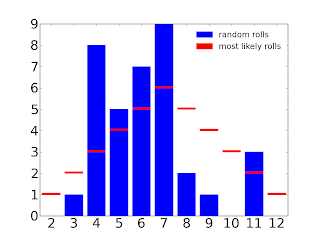I played a game of Settlers of Catan recently, and was frustrated by the dice rolling. I'm sure everybody has had this experience, when it seems like statistics have gone out the window. You start to think that you should have built on that spot with an 11 instead of the spot with the 6, because that what keeps coming up. It turns out that this is exactly what statistics says should happen, people just aren't very good at thinking about randomness.
I'll start with a quick explanation of how Settlers works. Each turn you roll two dice with six sides (2d6), then everybody gets resources if their settlements or cities border land that has that number on it. There are number tiles from 2-12, with little dots on them that tell you how often that number should happen. So 2 has a single dot, and 6 has five dots. A good settlement might a 6, a 5 and a 4 for a total of 12 dots.
We're going to take a look at what statistics says should happen in games like this. First lets just look at rolling 2d6. The fundamental idea behind trying to figure out what should happen, is that every time you roll a dice, each number on that dice is equally likely. It will help to understand if the dice are different colors, orange and black. Every time I roll, the orange die will randomly pick a number from 1-6 and the black dice will independently pick a random number from 1-6. Every number is equally likely for any given die, but if you are interested in the total of both die, then some numbers are more likely than others.
Probabilities like this don't tell you exactly what is going to happen, they can only tell you about how likely it is that things will happen. If you roll these dice 6000 times, you will get seven about 1000 times. But you might get 1032 or 973 or 1001, you can't know in advance. The typical variation in how many sevens you roll will be roughly the square root of how many you expected to roll based on the probability. The square root of 1000 is about 30, so you will typically get 1000 sevens to within 30 or so. If you only roll these dice 36 times, you expect to get 1 two. The square root of 1 is 1. This means you expect to have +/- 100% or more variations in how many twos you actually get. The point is, if you look at a lot of dice rolls, the variations will be a small percent of the total rolls. But if you look at just a few dice rolls, the variations will be almost as big as the total rolls. And in board games we almost always look at just a few dice rolls.
I ran some simulations to give you an idea of what this means. The next two pictures are simulations of rolling 2d6 36 times. This is like going through 9 turns in a 4 player game of Settlers. The red lines show how many times each number is expected to come up, and the blue bars show how many times it actually did come up. You can see that there is huge variation in each set of 9 turns. In case you haven't seen this type of plot, the x-axis shows the value of the dice rolls, and the y-axis shows how many times it happened.
 |
| Sucks if you have any numbers of 7. |
 |
| Looks a bit more like what you expect, but 11s beat 5s and tied 8s. |
 |
| When you look at lots of rolls, the distribution is pretty close to the most likely distribution. |
So now we can see why the dice drive us crazy so often. If you look at small sets of rolls, statistics say that weird stuff will happen. Uncommon rolls will come up more often than common rolls, regularly. It would actually be weird if that didn't happen! When did the dice screw you over? Or make the game for you? Leave a comment.
PS If you want to know more about the statistics of random events, look up the Poisson Distribution. Can you figure out where I fudged on the math to make the story simpler?




Statistics? What's that?
ReplyDeleteI love "random" games (dice etc.), they're so easy to influence. Sometimes my very presence at the table can cause weird things. Like 40+ hits on 10 dice (5+ hits, exploding d6). Or me never doing a single point of damage my last Descent campaign because I subconsciously hated that game (any hit, which had around 50% chance of 1+ damage was mitigated by the armor roll. Or missed entirely, 1 in 6). The same goes for my familiar, who had like ~75% of doing damage. For like 40 rolls in a row.
And don't even get me started on Infinity. The one thing that stops my opponent from screaming weighted dice is the fact that there's no use as sometimes you want to roll high, sometimes low, and most often the exact number for a critical. On multiple d20s.
I feel the same way sometimes. I've been tempted to actually write down all of my rolls for a few play sessions so see if they actually follow the theory. I bet they would, but it definitely doesn't feel that way sometimes.
Delete